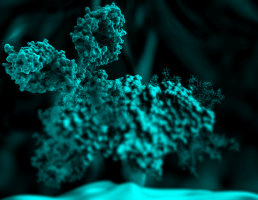
Combining an investigational anti-GD2 monoclonal antibody with induction chemotherapy yielded promising two-year event-free survival in paediatric patients with newly diagnosed high-risk neuroblastoma, according to a phase II trial published in the journal Clinical Cancer Research.
Approximately 650 children are diagnosed with neuroblastoma each year in North America, and the disease predominantly affects children under the age of five years.
"Because the symptoms can be non-specific, about half of patients are diagnosed after the cancer has spread and progressed to high-risk neuroblastoma," according to Wayne L. Furman, the author of this study.
Patients with high-risk neuroblastoma undergo intense treatment that includes chemotherapy, surgery, stem cell transplant, radiotherapy, a biologic agent, and treatment with a monoclonal anti-GD2 antibody called dinutuximab.
“Despite the aggressive treatment these kids receive, more than half have disease recurrence,” said Furman.
Because dinutuximab relies on the action of immune cells for its anticancer effects, it is administered at the end of therapy to avoid chemotherapy-induced immunosuppression.
"However, prior studies in adult cancers with a variety of monoclonal antibodies showed that administering monoclonal antibodies concurrently with chemotherapy resulted in additive and sometimes synergistic effects," Furman explained.
Furman and colleagues utilised a unique anti-GD2 antibody, hu14.18K322A, that binds to the same epitope as dinutuximab but has been humanised to reduce allergic reactions and modified to reduce pain and enhance antibody-dependent cell-mediated cytotoxicity.
The study enrolled 43 patients, 19 years or younger, with newly diagnosed high-risk neuroblastoma.
Patients received six courses of induction chemotherapy in combination with hu14.18K322A, followed by immune-boosting factors.
Some patients received an additional course of hu14.18K322A along with infusion of natural killer cells during the consolidation phase of treatment.
Minimal residual disease was treated with hu14.18K322A and immune-boosting factors.
Immune-boosting factors included granulocyte-macrophage colony-stimulating factor (GM-CSF) and interleukin-2 (IL-2).
Thirty-two of the 42 evaluable patients experienced at least partial responses after the first two cycles, with one patient reaching a complete response and six patients experiencing very good partial responses.
All but one patient experienced measurable reductions in primary tumour volume.
No patients experienced disease progression during induction chemotherapy.
"The two-year event-free survival was 85.7 percent, compared with approximately 50 percent in a historical control group that did not receive an anti-GD2 antibody during induction chemotherapy," according to Furman.
“The results were beyond our wildest dreams,” added Furman. “Many of these kids at diagnosis had multiple metastases all over their body visualised on MIBG scans, and after only two courses, many of these were completely clear.”
Furman noted that hu14.18K322A appeared to cause fewer allergic reactions and less pain than dinutuximab, even when the dose of hu14.18K322A was more than twice the standard dose of dinutuximab.
“I think adding the anti-GD2 antibody starting with the first cycle of treatment is the way to treat these patients, certainly in our experience,” Furman said.
He added that this approach needs to be proven in a larger, multi-centre study.
"One of the limitations of the study is that it was performed at a single institution, and there may be referral patterns that introduce bias in patient selection," explained Furman. "Another limitation is that additional changes made to the treatment regimen preclude direct comparison to the historical control group."
The World Cancer Declaration recognises that to make major reductions in premature deaths, innovative education and training opportunities for healthcare workers in all disciplines of cancer control need to improve significantly.
ecancer plays a critical part in improving access to education for medical professionals.
Every day we help doctors, nurses, patients and their advocates to further their knowledge and improve the quality of care. Please make a donation to support our ongoing work.
Thank you for your support.